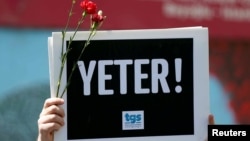With the observation of World Press Freedom Day on Thursday, a group of press freedom organizations is calling attention to challenges faced by journalists in the United States.
The report cites a number of threats to the work of journalists, including a rise in whistleblower prosecutions, government restrictions on public information, stigmatization by politicians, physical attacks and arbitrary arrests.
“The alarming rise in threats to press freedom in the U.S. over recent years must be challenged,” said Thomas Hughes, executive director of Article 19. “Not only do these threats impact on freedom of expression in the U.S., but they have repercussions around the world.”
WATCH: Rights Groups Highlight New Threats on World Press Freedom Day
Article 19 joined with the Committee to Protect Journalists, International Freedom of Expression Exchange, International Press Institute, Index on Censorship and Reporters Without Borders to interview U.S. journalists.
Their report said despite current threats, protections in the U.S. Constitution make media in the United States among the most free in the world. But it noted some of President Donald Trump’s statements, most notably his rejection of what he calls “fake news,” being echoed by leaders in other countries, including Venezuelan President Nicolas Maduro, Syrian President Bashar al-Assad and Myanmar’s de facto leader Aung San Suu Kyi.
“The pressures that journalists are facing in the U.S. are reflective of the toxic atmosphere toward journalism being stoked by global leaders,” said Jodie Ginsberg, chief executive officer of Index on Censorship. “Animosity toward the press is undermining the public’s right to information.”
The report notes a rise in whistleblower prosecutions began under former President Barack Obama, and expresses concern about the Trump administration’s positions on reporters’ abilities to protect their sources. It also faults Trump for verbal attacks on the media, saying those have helped embolden other politicians to do the same.
“By openly and aggressively targeting journalists and media outlets, the current U.S. administration risks undermining media freedom and creates a culture where journalists find themselves unprotected,” the report says.
Reporters Without Borders cited those concerns in its own annual press freedom rankings last week as it dropped the United States down two spots.
The White House rejected criticisms, with Press Secretary Sarah Huckabee Sanders telling reporters she thinks the Trump administration is “one of the most accessible” in decades.
“We support a free press, but we also support a fair press,” Sanders said. “And I think that those things should go hand in hand and there’s a certain responsibility by the press to report accurate information.”
The United Nations launched World Press Freedom Day in 1993 as a way to encourage the development of further freedom of the press, and to highlight the ways in which media organizations are “censored, fined, suspended and closed down,” while journalists face harassment, attacks, detentions and murder.
Reporters Without Borders reports that so far in 2018, 23 journalists have been killed and 176 imprisoned across the world.










